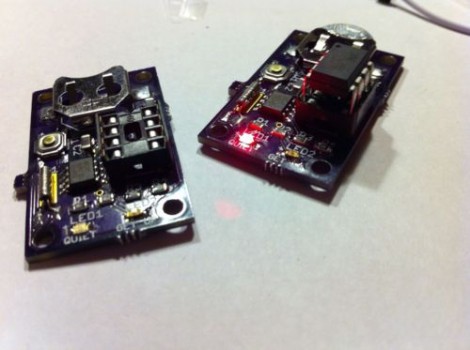
Like many parents, [Mike Tsao] is plagued by his kids’ urge to rise like the dead long before he’s ready to wake up. In an effort to preserve sanity, he built this clock to let the young ones know when it’s okay to get out of bed. Fittingly, he calls it the OK-Wake.
You may notice that the clock doesn’t have a display. That’s because his children are still too young to tell time (this is the foundation for needing a custom clock). Instead, that LED acts as the feedback. At night it will be off. Starting ninety minutes before it’s time to wake the LED will begin to pulse red, increasing in frequency as the target time approaches. When it’s okay to get out of bed the LED turns green and exhibits a pleasant “breathing” behaviour.
An ATtiny25 drives the device, along with an RTC chip. The single button is used to set the alarm. Actual time doesn’t really matter at all. Instead, the button just sets the alarm for twelve hours from when it’s pressed.
















I need to make one of these. Now that it gets light at 5:30 in the morning, our kids are bouncing out of bed way too early.
Sounds like you need some light-blocking curtains! They’ve worked pretty well for us.
I think he’s missed the obvious answer, its called whisky.
For Dad, right?
Sure…
I can understand wanting one’s sleep, but encouraging children to sleep beyond the time their bodies wake them? I mean yeah…if they wake up at 3AM, but if they’re just bright and cheery at 6AM, making em sleep later just teaches them to ignore their body-clock and leads to the kind of drowsiness that desires coffee and sugar for breakfast. :p
I would love to get my childhood sleep cycle back. :0 I would usually wake up a couple hours before I had to go to school, play on the computer for a while, then get ready for school. Now? I have to pry myself out of bed when it’s time to get ready. :p
As much as you might be right, you are also wrong, because if the sleep schedule is not the desired one, you must work to correct it. How do you think you do that?
No no, you got it backwards.
You’re supposed to set the kids alarm clock a couple hours earlier than their natural waking time. This prepares them for a long life of being jarred from sleep before the body wants to. Repeat daily for the following 60-70 years.
Kids are clever, I’m sure they’ll quickly figure out that all this means is “don’t wake daddy,” which is really the point.
Alex — you’re exactly right: it’s not about controlling sleep, which any parent knows is impossible. It’s about letting the kids know when it’s OK to run into the parents’ room and start jumping on their bed. 6am is fine, but 5:45am can be painful. (By the way, contrary to the writeup, the kids actually aren’t mine; I did the project for a friend.)
Tonight will be the first night they try it. I give it a 50-50 chance of having any effect at all. :)
Nice idea. I could use something like that. Since I had to redirect my 3 year old confused son back to bed this morning @ 5:15AM. :) I think all parents of young children can relate to this issue.
Same here, my 6 Month old just wont stop waking in th emiddle of the night, screaming and crying, I should build one too!
Perhaps it will be obvious from this comment that I am not a parent, but wouldn’t it be better to point your child towards an actual clock, surely if they can comprehend this, they can understand that if a digital clock says “6” its too early, but if it says “7” its okay to get up.
Sorry, but a 1-3 year old’s brain just doesn’t work that way. Especially when they wake up in the wee hours confused, sad, scared, crying, and/or disoriented. My son was able to make decisions based on the binary of light-on/light-off, but if we went the reading route there would have been a lot of trying to explain it again, getting him to tell me what number it was, and explaining it again, and then trying to get him back into bed after all of that.
I can also guarantee that you’d get some teary nights where the kid confused 8 with 6 and stayed in bed when she didn’t have to, or up at 1 AM when they thought it said 7.
We did something like this, but went the COTS route. My wife had the idea of plugging in a color-cycling night light into a plug-in lamp timer. We all called it the “Rainbow Light.” Went on around 7 AM and off at 8 PM. If he woke up and the light was on, he had to go back to bed. When getting ready for bed, he was rewarded for doing his thing with minimal fussing and stalling by being able to read books or play until he heard the sound of the relay. Worked a treat!
He’ll be 4 next month. The routines learned with the Rainbow Light have stuck, and we have no issues getting him to bed around 8:30 PM and have him wake up in the middle of the night once or twice in the last year (really).
I think I’m more impressed he’s able to get his kids to obey a blinking light than I am by the build.
You must have kids. :)
hehe, our solution came all by itself: after a few “its not morning yet, go to sleep”, the kids started calling softly “daaad, is it morning yet?” and a “no” would earn me another half an hour of sleep :-)
When I was a kid, I used to wake up early in the morning long before everyone else. I went to the living room and sat on the carpet in my pyjamas watching television. I especially liked it when my parents had had some people over the other night so I could sneak into the kitchen in the morning and eat all the leftover snacks. I could easily make all children morning programmes (starting about 6 AM) that way plus some commercials that preceded them.
No need to wake my parents.
I built something like this (much cruder – Arduino, RGB LED, and Adafruits’s RTC) for a friend’s 3 year old daughter and she loves it. It does not work every day, but the days she stays in her room are priceless…
Like
Like: the article, the idea, the comments.
You can buy kid’s clocks that do this for about $30; I have one; it turns orange when it’s bedtime and green when its OK to come out of the room It also speaks the current time when they push the button, cycles the display between analog/digital and continues to light up and operate normally off of a battery if the power goes out. Such a thing would have cost me more than $30 to build so I just bought it–
I agree with the earlier comments that it’s not so much about controlling the children’s sleep but the parent’s. It’s fine if my kids wake up at 6 or 7, but that doesn’t mean I want them to wake me up on the weekend at that time! The lamp on an on/off timer is also a good alternative.